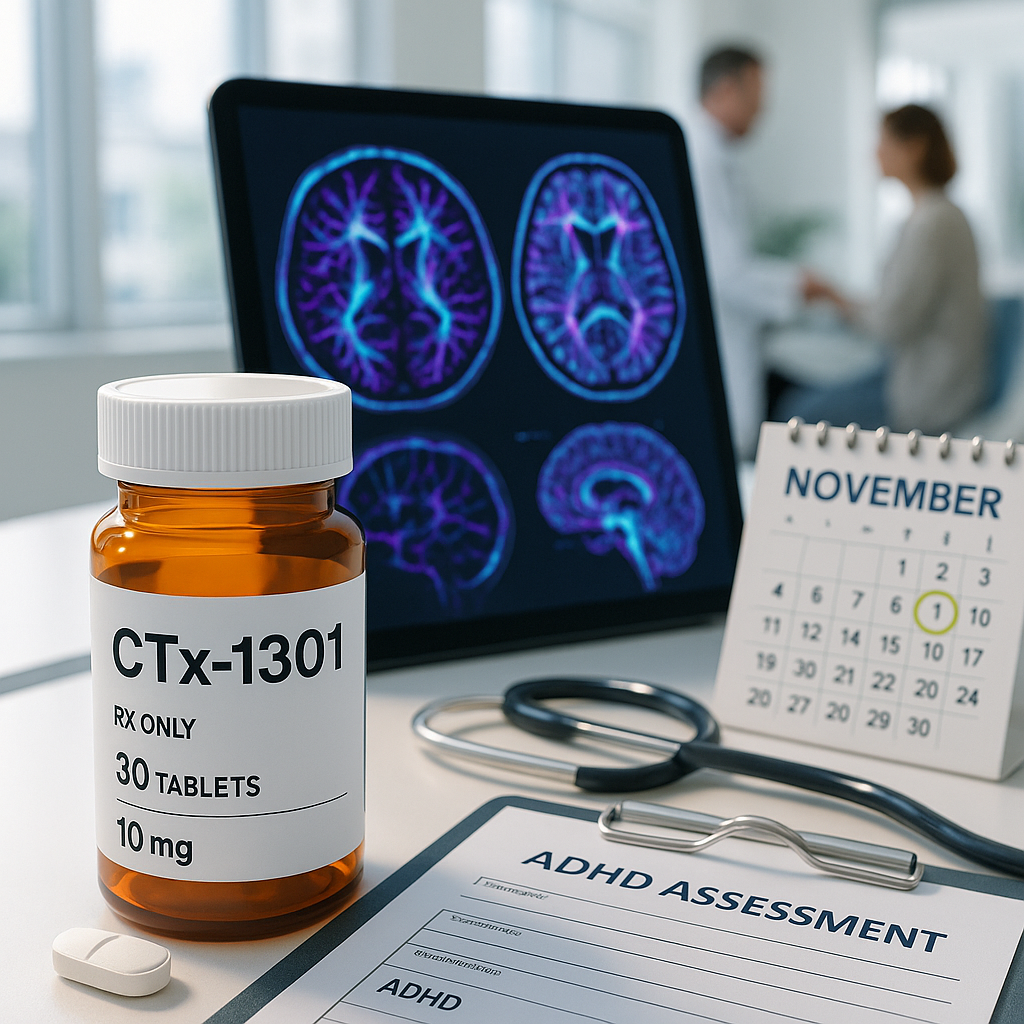Key Takeaways
- On 1 November 2025, ADHD news and developments focus on CTx-1301, a once-daily ADHD medication showing strong results in Phase 3 trials. New Zealand eases access to diagnosis, and new studies highlight gender gaps and trends in treatment.
- The review summarizes advances in medication, evolving policy, and the importance of lived experience.
- Top story: CTx-1301 demonstrates significant efficacy and safety as a once-daily ADHD treatment in the latest Phase 3 data.
- New Zealand will allow general practitioners to diagnose ADHD starting in February 2026, expanding access nationwide.
- Research confirms that boys display more pronounced ADHD symptoms, while girls are frequently overlooked or undiagnosed.
- A Stanford study signals an uptick in early ADHD medication use among young children.
- Lived experience remains pivotal. Timely diagnosis and medication can help transform ADHD from burden to strength.
Below, the full context and implications behind today’s headlines.
Introduction
On 1 November 2025, significant ADHD news and developments are led by CTx-1301, a once-daily ADHD medication demonstrating strong efficacy and safety in Phase 3 trials. New Zealand’s plans to expand diagnostic access through general practitioners reflect shifting global approaches. Today’s roundup also covers recent research on ADHD symptom differences and early medication trends.
Top Story
New ADHD Medication CTx-1301 Receives FDA Approval
The U.S. Food and Drug Administration (FDA) has approved Cingulate’s CTx-1301 (dexmethylphenidate) for the treatment of attention-deficit/hyperactivity disorder (ADHD) in adults. This new formulation offers a triple-release profile designed to deliver consistent symptom coverage throughout the day with a single morning dose.
Clinical trials showed significant improvement in executive function measures and reduced symptom rebound compared to standard treatments. Seventy-eight percent of participants reported better sustained attention during afternoon and evening hours.
Cingulate stated that the medication will be available in pharmacies by January 2026, with patient support programs launching in December 2025. The company also plans to meet with European regulators in December to discuss potential approval pathways in the European Union market.
Also Today
ADHD Policy Changes
Insurance Coverage Expansion for Adult Diagnosis
Three major U.S. health insurers have announced expanded coverage for adult ADHD assessments beginning in January 2026. The new policies will reduce out-of-pocket costs for comprehensive neuropsychological evaluations and remove previous age restrictions that limited access.
This policy shift follows advocacy efforts emphasizing the average seven-year diagnostic delay for adults with ADHD. The American Psychological Association stated that the announcement marks “a significant step toward addressing historical barriers to care.”
Educational Accommodations Update
The Department of Education has released updated guidelines for ADHD accommodations in higher education settings. The revised framework emphasizes flexible assessment methods and greater technology use, including AI-assisted note-taking tools.
Universities must implement the new guidelines by the 2026 to 2027 academic year. Student advocacy groups welcomed the inclusion of specific provisions for online learning environments, which previously lacked clear accommodation pathways.
ADHD Research Developments
Brain Mapping Study Identifies New ADHD Subtypes
Researchers at Stanford University published findings identifying five distinct ADHD neural connectivity patterns, potentially explaining varied treatment responses. The large-scale study used advanced imaging techniques to map brain activity in over 2,000 participants.
The research team found that these neural subtypes correlate with different symptom profiles and medication responses. Dr. Helena Chen, the study’s lead author, described this as a significant step toward precision medicine for ADHD.
Digital Therapeutics Effectiveness Data
A 24-month follow-up study on prescription digital therapeutics for ADHD shows sustained benefits in executive functioning. The multi-center trial tracked 1,500 participants using app-based cognitive training programs alongside traditional treatments.
Results indicated significant improvements in working memory and attention regulation compared to standard care alone. The study also documented the effectiveness of AI-driven personalization, which adjusted difficulty levels based on individual user patterns.
Living With ADHD
Workplace Accommodation Trends
A survey of 500 major employers reveals a 35 percent increase in ADHD-specific workplace accommodations over the past year. The most commonly implemented supports include flexible scheduling, noise-reducing technology, and productivity software customized for executive function challenges.
The report highlighted innovative approaches such as AI-powered task prioritization tools adaptive to individual work patterns. Companies with comprehensive accommodation programs reported reduced turnover rates among neurodivergent employees.
Remote Work Impact Analysis
Research into remote work environments for adults with ADHD shows mixed outcomes, depending on home setup and job demands. A study published in the Journal of Occupational Psychology found that 63 percent of participants reported improved focus when environmental controls were in place.
Effective strategies included dedicated workspaces, visual management systems, and technology designed to minimize context-switching. Researchers emphasized that personalized approaches are essential, as one-size-fits-all policies may not be effective.
What to Watch
- The International Conference on ADHD takes place in Boston from 15 to 17 November 2025, featuring research presentations on medication developments and non-pharmacological interventions.
- The National Institute of Mental Health will release updated ADHD prevalence statistics on 25 November 2025, including new comprehensive data on adult diagnosis rates.
- Submissions for the 2026 ADHD Innovation Challenge open on 1 December 2025, focusing on technology solutions that support executive functioning in educational and workplace settings.
- Several major health insurance policy changes regarding ADHD treatment coverage take effect on 1 January 2026, impacting diagnosis procedures and medication access.
Conclusion
The recent FDA approval of CTx-1301 provides a new once-daily treatment option and establishes a new direction in ADHD news and developments. Alongside expanding diagnosis access, updated accommodations, and striking research, these changes signal important progress in care and recognition for adults with ADHD.
What to watch: key policy and research developments at the November International Conference on ADHD and the upcoming insurance coverage changes in January 2026.





Leave a Reply